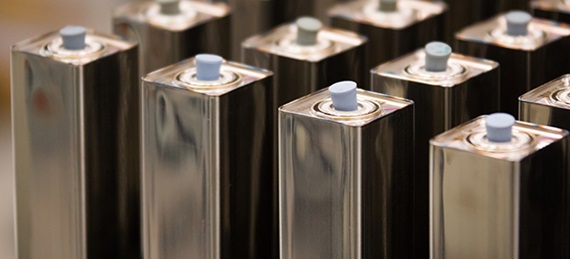Batteries
At Empa, novel battery technologies are developed not only for electronic applications, but also in particular for applications in electromobility and grid scale storage of intermittent renewable energy sources.

Lithium ion batteries
Lithium ion batteries have revolutionized the portable electronics market. Nevertheless, further improvements in energy and power density as well as cost reduction are necessary to extend the range of applications to new markets. Besides these performance metrics, lithium ion battery development at Empa also aims at reducing the environmental impact of lithium ion batteries, e.g., by employing aqeous chemistries.
Magnesium ion batteries
Batteries based on multivalent ions, such as magnesium ions, promise to enable higher energy densities. Unlike lithium ions, which can only carry one electrical charge, magnesium ions carry twice the amount of charge. Research on multivalent batteries is still at an early stage of development, but Empa already demonstrated several functional concepts.
All-solid-state batteries
Lithium ion batteries make use of flammable liquid organic electrolytes. All-solid-state batteries developed at Empa promise to circumvent these challenges by replacing the liquid electrolyte with a solid-state ion conducting material. Already today, solid-state electrolytes developed at Empa offer ion conductivities comparable to those of liquid electrolytes, good charge/discharge rate performance and excellent cycling stability.
Molten salt batteries
Empa contributes to the development of molten salt batteries operating at temperatures of 300°C. In particular batteries based on aluminum oxide, sodium chloride, and nickel offer excellent energy density, excellent operational safety, as well as a non-critical, cost-effective supply chain for the raw materials.
Further information about Empa's battery research activities
There are several Empa labs that are active in battery research. You will find more information on the webpages of the following labs:
In addition to the research activities regarding new materials and coating processes, the Empa Laboratory for Reliability Science and Technology operates a battery testing facility where batteries, e.g. Li ion batteries, are tested regarding their reliabily and safety.

-
Share
